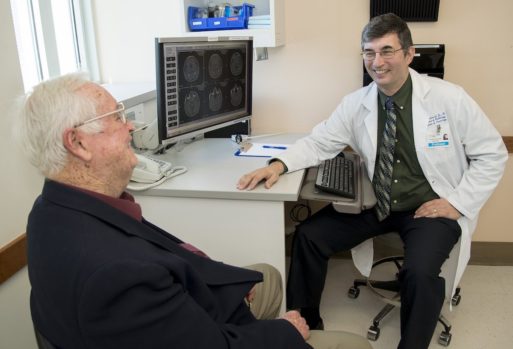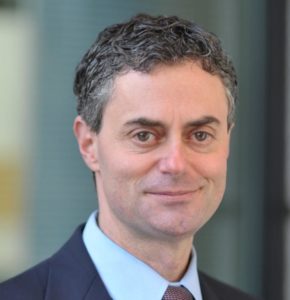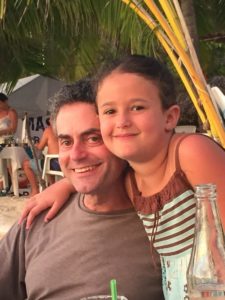Dr. Barak Gaster is a primary care physician and a professor of medicine at the University of Washington who has developed an advance care directive for dementia. Through his work, he realized that dementia is one of the most difficult issues facing primary care physicians today. Dr. Gaster has gained a national reputation for looking at problems in medicine and creating solutions.
Editor’s note: This interview has been edited for length and readability.

Dr. Barak Gaster
Credit: uwmedicine.org
Ellary Allis: Can you give us a little background on yourself and your work?
Dr. Barak Gaster: I’m a primary care doctor at the University of Washington and a professor of medicine at the University of Washington School of Medicine. For 20 years, I’ve had a job that includes a mix of seeing patients and doing research and curriculum development on the hardest issues facing primary care doctors. Over the years, I’ve written and worked on topics such as the complexity of talking to men about prostate cancer screening; how to treat chronic pain safely in a primary care setting; and how to talk to patients about the pros and cons and evidence behind herbal medicines.
It was about four years ago that I realized that the hardest issue facing primary care doctors, and really society in general, is dementia. The number of people who are living with dementia is increasing quickly. We as primary care doctors are really struggling with how best to identify it in its early stages and how to help patients and families navigate through the stages of the disease. So, four years ago, I started building a curriculum for primary care doctors addressing how to identify dementia and help patients and families navigate through it. As part of doing that, I really wanted to focus on the process of helping patients and families with advance care planning, specifically as it relates to dementia.
I started figuring out what kind of tools would be helpful for people in expressing what their wishes are if they were to have worsening dementia. I’ve been working on that with other colleagues here at the University of Washington, in fields like geriatrics and palliative care and neurology, to come up with advance directive for dementia. We published our work in the Journal of the American Medical Association about a year ago. It was written about in the New York Times in January, and since then more than 100,000 people have downloaded the form from the website where it’s available for free for anyone that would like to take a look at it.
Ellary: When did you release it on your dementia-directive.org website?
Dr. Gaster: It was almost exactly a year ago, right when the JAMA article came out in November. It truly didn’t have that much traffic until January, when the article came out in the New York Times, then there was a giant amount of interest. We had a really nice interview about the advance directive for dementia on NPR soon after that. Since then, it’s been a grassroots phenomenon. Between 500 and 1,000 people are accessing it each week all over the country.
Ellary: What drew you to focus your energy on these more difficult aspects of primary care?
Dr. Gaster: My main job is to be a primary care doctor, and I think really hard about the issues that are most difficult for me as I go through my day. I talk to my colleagues about what they find to be the most difficult issues. I’m very involved with medical education at the University of Washington School of Medicine, so I supervise residents as they go through their continuity clinic during their three years of internal medicine training. In doing that, I also see which issues they end up struggling with the most. Those are the issues that are the most interesting to me and the ones I want to figure out how to approach in an efficient and family-centered way.
Ellary: Do you have any thoughts on why the incidence of dementia is increasing so quickly?
Dr. Gaster: Yes, there are two things that are greatly contributing to that trend. One is that people are living longer than they have before. We’re doing a better job of treating heart attacks and cancer, so people are living into their 80s and 90s with a much higher frequency than before. There was also a demographic phenomenon that happened between 1945 and 1965 called the Baby Boom, where the number of live births in the United States had a huge spike. The result is that there’s a big population bubble today. The older baby boomers are now in their late 60s and early 70s, which is the age at which people start to become at risk for dementia. The fact that more baby boomers will live into their 80s and 90s than any generation before them, and the fact that there are a lot more of them, result in estimates that the number of people living with dementia in the United States is going to double and even triple in the coming years.

Credit: twitter.com
Ellary: Why do you think most living wills don’t include plans for dementia?
Dr. Gaster: As I set out in thinking about this problem, I looked for other examples of dementia living wills. I didn’t find much out there, and that’s partly because it’s a tricky issue to try and anticipate and give guidance for because it’s a complex disease that lasts for a very long time and goes through many different stages that are pretty different from each other. It’s not like you can say, “If I have dementia, I want this,” or “If I don’t have dementia, I want that,” because it’s not black and white, it’s a very gradual process of losing your cognitive function.
What’s different about dementia is not only that it is very slowly progressive, so it changes very gradually, but also that for a very large portion of that time people have lost the ability to guide their own care. For other diseases that progress slowly, like heart disease, up until the very end people are perfectly able to make decisions about their care. So having a specific directive for all of those conditions doesn’t make much sense. Dementia is different because very early in the process people become less and less able to make medical decisions about their care. So that’s where you really need an advanced directive to express your wishes and give your loved ones something to reference to help guide them in the decisions that are often really hard for people to make.
Ellary: What does the dementia advance care directive include that specifically relates to dementia?
Dr. Gaster: The way that we ended up structuring it was by thinking about dementia in three broad stages: a mild, moderate and severe stage. For each of the three stages, we present a brief description of the milestones that mark that stage for most people. Under those three descriptions, we give people four options to choose from in terms of what they would want the goal of their medical care to be. It allows people to express how they want the goals of their medical care to shift as the disease progresses.
Ellary: Do you give the form to healthy people as well, or only people that have developed signs of dementia already?
Dr. Gaster: When I was first developing the form, I thought the most important time for people to fill it out would be at that very earliest stage when there was detectable signs of dementia. At that point, it would be clear that someone would need a directive like this and that would be a really important window of time to help them fill it out while they were still able. But I found that only a small number of people who I’d diagnosed with mild cognitive impairment filled out the form. The majority of the time people seemed like they were grateful and promised that they would take it home and think about it, yet they they almost never brought the form back.
Then, instead of giving it to people I was diagnosing with early stage memory loss, I just started giving it to everyone. I gave it to all of my patients who were there for their regular check-ups, starting at age 65 or 70. Remarkably, I found that 70 or 80 percent of people without cognitive impairment started returning the forms to me. That’s when my thinking shifted. I began thinking the best time for somebody to fill a form like this out is when they hit the age when they are at significant risk of developing dementia — around 65 or 70 –before they develop any signs of cognitive impairment. It’s more difficult for people with mild cognitive impairment to fill out the form, for reasons I will go into.

Dr. Barak Gaster
Ellary Allis: How difficult is for someone with mild cognitive impairment to fill out the advance directive for dementia?
Dr. Barak Gaster: I didn’t mean to imply that someone with cognitive impairment couldn’t fill the Advance Directive for Dementia out. Most people would still have the decision making capacity to do so. However, one of the reasons it’s harder for someone with mild cognitive impairment to fill a form like this out is because of the fear and shock of the diagnosis and the resulting emotional paralysis that happens. And even after they have more or less settled into acceptance around it, someone with mild cognitive impairment would have more difficulty imagining the future state of being faced with abstract medical scenarios, and then imagining what that future self would want. That’s a much more complex decision making process for someone with cognitive impairment to go through.
Many people still could do it, and it can be meaningful when they do. But it’s just going to be a lot harder because its a complex executive function task that people often have trouble with. The NPR show I was on was a call-in show, and one of the callers had mild cognitive impairment. He described having the advance directive form on his countertop for over a year and how hard it was for him to fill out. He got really emotional talking about it. It was a poignant moment that really did help crystalize for me why filling out an advance directive form is hard for people with even mild cognitive impairment.
In the curriculum that I’m building for primary care doctors to help patients and families navigate through a dementia illness, advance care planning plays a big part. I focus on offering people the opportunity to fill out an advance directive while acknowledging that that’s going to be really hard. Rather that focusing right way on advance directives for people with mild cognitive impairment, it’s helpful for people to try to ground decision- making in the here and now — for example, what someone would want if they went into respiratory arrest, what would they want if they developed pneumonia. And then I focus on facilitating the hard conversations people have to have with their families to make careful and reasoned medical decisions that take into account what they think their loved one would have wanted at that point in their dementia. And having a dementia directive can help inform those conversations. It can really help make those decisions better decisions, because the family can have more confidence that the decisions they’re making are aligned with what their loved one would have wanted.
Ellary: That sounds really helpful. Can you talk about what the Memory and Brain Wellness Center is and what your role is?
Dr. Gaster: The University of Washington has a phenomenal program whose mission is to provide medical care and do research and community outreach for patients with dementia called the Memory and Brain Wellness Center. I’m their primary care liaison. Most of the staff of that center are neurologists, neuropsychologists, psychiatrists and social workers, and they are really aware that the role of the primary care doctor is important in terms of helping to support them in their specialist roles. They also recognize the role of primary care doctors in long term care for dementia patients and making the best referrals for patients. The specialists really need to be partnered with enlightened primary care doctors. I’m working on that aspect.
Ellary: You recently had an op-ed published in the Seattle Times. What was that about?
Dr Gaster: It was specifically about why it’s so important for us to be talking about dementia. We need to bring the disease out of the shadows and help the public and primary care doctors feel less afraid of talking about it and facing it. By far the most important thing is to make it clear that the directive is available and free for anyone to download and look at.

Dr. Barak Gaster
Ellary: Does the Advance Directive for Dementia need to be witnessed or notarized?
Dr. Gaster: The Advance Directive for Dementia does not need to be witnessed or notarized. We really thought hard about whether we should have a place for witnessing or notary in the dementia directive, and ended up deciding not to do so. When you put spaces like that on a form or an advance directive, it’s going to decrease the number of people who will fill it out. It’s going to be an obstacle in getting them to do it, because there’s that added process of finding witnesses or finding a notary.
We also need to take advance directives out of people’s security deposit boxes where nobody knows what they are or what they say. It makes sense that that’s where a will would be kept, but in terms of a document that can really help guide care while somebody’s still alive, you don’t want it locked up somewhere in your lawyer’s office. You want it somewhere accessible. You want your family to have copies of it if needed. For that reason, we decided not to have a place on the Advance Directive for Dementia for people to witness or notarize it, with the idea that it’s never going to be a locked in legal document. It’s a communication tool, a way to express what your wishes are, to document them and share them with your loved ones who would be the people that would need to make medical decisions on your behalf if you had dementia.
Ellary: What legal documents should a person with mild cognitive impairment be sure to fill out?
Dr. Gaster: The most important legal document for someone to fill out if they are diagnosed with mild cognitive impairment is a Durable Power of Attorney for Healthcare form. Each state has a very legally binding document with which someone can identify who they would want their health care proxy or decision maker to be if they were unable to make decisions for themselves. In most states, if the document isn’t filled out, there is a hierarchy that determines who the decision maker would be if the person wasn’t able to make decisions for themselves. Usually the spouse is number one, and then there’s variations on whether the next in line is children or parents, and on from there.
What’s really important about mild cognitive impairment is that it is a disease that, in most people, has a 10 or 15 or 20-year time horizon to it. Identifying who the person would want to be the backup to their legal default is really important because people with mild cognitive impairment might outlive their spouses. It’s important for them to legally identify who they would want their health care proxy to be if their spouse wasn’t available while they still have the mental capacity to do that.
When you get to living wills, it’s a little bit fuzzier as to just how legally binding they are. They’re mostly tools to communicate and express your wishes as to who the health care proxy or durable power of attorney for healthcare is. However, they tend to focus on issues that are really rare, like if you’re in a persistent vegetative state or a permanent coma. That is a tricky and sometimes contested situation, so having it witnessed and notarized is good. Every state that has its own statutory living will almost always has a place on it for it to be witnessed or notarized.
Ellary: Thank you, Dr. Gaster, for speaking with me today and sharing your insight and expertise. I’m sure our readers will find this very informative.
Dr. Gaster: You’re welcome.

 What Is The Advance Directive For Dementia?
What Is The Advance Directive For Dementia?


 “Hand to Earth” by Andy Goldsworthy
“Hand to Earth” by Andy Goldsworthy
 Trans Remembrance Project Provides a Community of Grieving
Trans Remembrance Project Provides a Community of Grieving
 Caring for a Dying Loved One? Be Gentle With Yourself.
Caring for a Dying Loved One? Be Gentle With Yourself.














